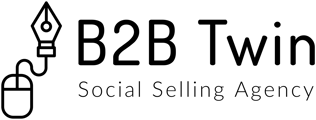Hybrid Selling - Strategic with Social
Measuring social selling performance goes beyond quantitative metrics.
SOCIAL MEDIASOCIAL SELLINGSALESB2BAI


With social media, the sales world has undergone a seismic shift. Gone are the days of cold calling and door-to-door pitches; today, it’s all about building relationships and making connections online. But how can businesses harness the power of social selling to drive their B2B sales? In this article, we will explore the concept of B2B social selling mastery – integrating strategic sales methodologies with effective social selling practices – and uncover the secrets to success in this landscape.
Imagine a world where you could connect with potential clients, build meaningful relationships, and close deals without leaving your office. This is not some distant dream; it’s the reality of B2B social selling mastery. This article will explore how businesses can bridge traditional strategic sales methodologies with modern social selling practices to unlock unprecedented success in today’s digital age. Are you ready to take your B2B sales game to a new level? Then read on as we unravel the secrets behind this powerful approach.
The Rise of Social Selling in B2B Sales
In recent years, the role of social media in B2B sales has undergone a dramatic transformation. No longer used solely for marketing and brand promotion, social media platforms have become powerful tools for sales professionals to connect with prospects, build relationships, and close deals. This shift towards social selling in the B2B arena is not surprising, given the increasing importance of digital communication and the changing buying preferences of decision-makers.
One significant advantage of social selling is its ability to facilitate personalized engagement with prospects. Sales professionals can leverage social media channels like LinkedIn, Twitter, or Facebook to identify potential buyers and start meaningful conversations. With access to rich data and insights these platforms provide, sellers can better understand their target audience’s needs and problems, enabling them to tailor their approach.
Social selling allows for real-time interactions with prospects throughout their entire buying journey. By participating in industry-related discussions or sharing valuable content on relevant topics, sellers can position themselves as trusted advisors who provide value beyond traditional sales pitches. This approach helps build credibility and keeps companies top-of-mind when prospects are ready to purchase.
As more businesses embrace digital transformation strategies and focus on remote work capabilities, the rise of social selling is expected to continue. Embracing this new paradigm requires a holistic approach that combines strategic sales methodologies with effective social selling practices. By equipping themselves with the right tools, techniques,
Understanding Strategic Sales Methodologies
Strategic sales methodologies are crucial for B2B social selling mastery, providing a clear framework to guide the sales process. Understanding these methodologies allows sales professionals to identify and target potential customers, tailor their messaging to meet their needs, and close more deals. One key aspect of strategic sales methodologies is expecting and overcoming objections. By addressing potential concerns or hesitations during the sales process, sales professionals can build trust with prospects and increase their chances of success.
Another aspect of strategic sales methodologies is emphasizing building long-term customer relationships. In today’s hyper-connected world, customers can access abundant information about products and services. Pushing a product or service is no longer enough –sales professionals must act as trusted advisors who can help customers navigate complex purchasing decisions. By focusing on relationship-building rather than closing a sale, sales professionals can position themselves as valuable partners rather than pushy vendors.
Leveraging Social Media Platforms for Sales Success
Leveraging social media platforms for sales success has become an essential strategy in today’s digital marketplace. Sales professionals can expand their reach and connect with potential clients globally by harnessing the power of LinkedIn, Twitter, and Facebook platforms. It’s no longer enough to rely on cold calls or face-to-face meetings; social media engagement is now vital.
One advantage of using social media for sales is the ability to build relationships before making contact. With platforms like LinkedIn, you can research your prospects’ interests, backgrounds, and connections - valuable information that can help you establish common ground when starting communication. By understanding your audience better, you can craft more personalized messages and create a stronger first impression.
Being active in social media allows you to position yourself as an industry expert. Share insightful articles or videos related to your field of expertise to establish credibility and attract attention from potential buyers. When prospects see you are knowledgeable about their problems and have solutions, they will be more likely to consider working with you. Building trust and showcasing your expertise through social media enhances your brand reputation and boosts sales success.
Integrating Social Selling into the Sales Process
Integrating social selling into sales has become a crucial strategy for B2B organizations looking to stay ahead in today’s competitive market. By leveraging social media platforms and tools, sales teams can improve prospecting efforts, build relationships with potential customers, and close more deals. But, note that incorporating social selling is not about replacing traditional sales methods but enhancing them.
One key aspect of integrating social selling into the sales process is using data analytics to gain valuable insights about prospects. By tracking engagement metrics on various social media channels, sales professionals can tailor their approach to each lead. This allows for more personalized interactions and enables salespeople to provide solutions that meet the needs of their clients.
Integrating social selling requires effective collaboration between marketing and sales teams. By aligning both departments’ strategies and goals, companies can ensure a seamless transition from initial lead generation through nurturing stages to conversion. With marketing providing relevant content and materials through various social channels, sales professionals can leverage these assets during prospect conversations, increasing credibility and trust.
Integrating social selling practices into the sales process combines the best of both worlds - combining strategic methodologies with modern digital techniques. It empowers organizations to build stronger customer relationships while staying relevant in a fast-paced market landscape where online presence is paramount for success - making it an essential component of any B2B business strategy today.
Best Practices for B2B Social Selling Mastery
Social selling has become an integral part of B2B sales strategies, allowing businesses to harness the power of social media platforms to engage with prospects and drive conversions. And while many companies have adopted social selling practices, not all are seeing success. To master B2B social selling, leveraging strategic sales methodologies with effective social selling practices is essential.
One practice is identifying and engaging with the right audience on social media. Instead of taking a scattergun approach and targeting everyone, narrow your focus by defining the ideal customer persona and tailoring your messaging. This allows you to connect with prospects more likely to be interested in your offerings, resulting in higher conversion rates.
Building relationships is crucial for successful B2B social selling. It’s important to remember that engagement on social media should go beyond pushing products or services. Instead, focus on providing value through insightful content and thought leadership within your industry. By positioning yourself as an expert and fostering genuine connections through meaningful interactions, you establish trust and credibility, which can lead to long-term business partnerships.
Measuring and Evaluating Social Selling Performance
Measuring and evaluating the performance of social selling strategies is essential for understanding their impact and making data-driven decisions. One way to measure success is by tracking key performance indicators (KPIs) for social selling. These could include metrics such as the number of qualified leads generated through social media channels, the conversion rate from social media interactions to sales, or the average deal size resulting from social selling efforts. By monitoring these KPIs, businesses can gain valuable insights into the effectiveness of their social selling efforts and make adjustments as needed.
But, it’s important to remember that measuring social selling performance goes beyond quantitative metrics. Qualitative assessments are crucial for evaluating how well a sales team is leveraging social media platforms and engaging with prospects. This could involve analyzing factors such as the quality of interactions on social media, the level of personalization in messaging, or customer feedback and sentiment about a company’s approach to social selling. Gathering this qualitative data helps paint a more comprehensive picture of how well social selling strategies resonate with potential customers and identifies areas for improvement.
Effective measurement and evaluation of social selling performance go hand in hand with continuous learning and refinement. By seeking customer feedback, identifying trends in data analysis, and staying up-to-date on industry trends, businesses can improve their strategic sales methodologies while harnessing the power of digital platforms for successful B2B relationships.
The Future of B2B Social Selling
B2B social selling appears to be bright and filled with endless possibilities. As technology advances, new tools and platforms will emerge that offer even more effective ways for sales professionals to connect with their prospects. Artificial intelligence (AI) and machine learning have transformed how sales teams operate, allowing them to make more informed decisions and personalize their approach based on customer preferences.
Integrating virtual reality (VR) into B2B social selling is exciting. Imagine giving product demos or walking potential clients through a virtual showroom without leaving your office. VR has the potential to revolutionize how B2B sales are conducted by creating immersive experiences that engage buyers on a whole new level. By embracing these emerging technologies, sales professionals can stay ahead of the curve and provide a unique selling proposition in a competitive market.
As social media platforms develop and mature, B2B social selling will become even more integrated into marketing strategies. Companies will invest in building strong online brands and cultivating meaningful relationships through engaging content. Social listening tools will become indispensable for understanding customer needs and tailoring messaging. This shift towards a more comprehensive approach will need sales professionals to be experts in their products or services and proficient in leveraging digital marketing techniques, such as content creation and lead nurturing.
In conclusion, mastering B2B social selling requires bridging traditional strategic sales methodologies with effective digital marketing strategies. By understanding the changing dynamics of buyer behavior and adapting to new technologies, sales professionals can position themselves as trusted advisors and build long-lasting relationships with clients. This will increase sales and create a competitive edge in the market. Businesses must train and equip their sales teams with the tools and knowledge to engage in B2B social selling.
